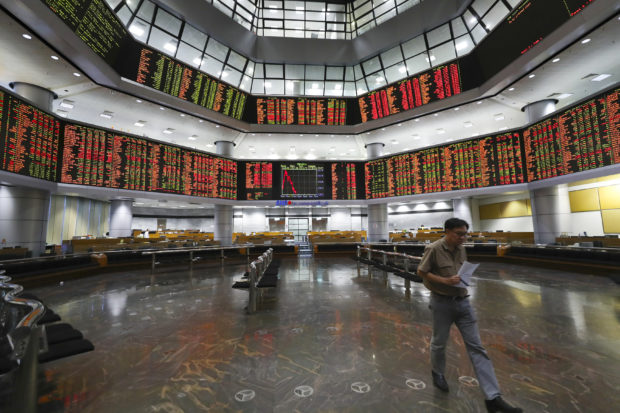Global stocks follow Wall Street lower on trade war fears
BEIJING – Global stock markets followed Wall Street lower Thursday after President Donald Trump said he could impose more tariffs on Chinese goods and Japan’s exports tumbled.

An investor walks in front of stock trading boards at a private stock market gallery in Kuala Lumpur, Malaysia, Thursday, July 18, 2019. Asian stock markets on Thursday followed Wall Street lower after President Donald Trump reignited trade fears by saying he could impose more tariffs on Chinese imports. (AP Photo/Vincent Thian)
Benchmarks in London, Frankfurt, Shanghai and Tokyo all declined.
In early trading, London’s FTSE 100 fell 0.6% to 7489.52 and Frankfurt’s DAX declined 0.9% to 12,232.74.
France’s CAC-40 lost 0.6% to 5539.39.
On Wall Street, futures for the Standard & Poor’s 500 index and the Dow Jones Industrial Average were down 0.3%.
In Asia, the Shanghai Composite Index lost 1% to 2,901.18 and Tokyo’s Nikkei 225 tumbled 1.9% to 21,046.24.
Article continues after this advertisementHong Kong’s Hang Seng retreated 0.5% to 28,438.99 and Seoul’s Kospi was 0.3% lower at 2,066.55. India’s Sensex lost 0.4% to 39050.29.
Article continues after this advertisementSydney’s S&P-ASX 200 shed 0.4% to 6,649.10. Taiwan and New Zealand gained while Southeast Asian markets were mixed.
Trump alarmed investors by saying he had $325 billion of Chinese imports available for additional tariffs “if we want.”
That shook markets that had been reassured by Trump’s June agreement with Chinese President Xi Jinping to resume trade negotiations.
The Chinese government warned tariff hikes would “create a new obstacle” in talks on ending their bruising fight over Beijing’s technology ambitions.
Trump’s comment “cast a dark cloud over lingering concerns on trade talk progress,” Mizuho bank analysts said in a report.
Japan reported June exports declined 6.8% from a year earlier. Imports fell 5.2%. For the first six months of this year, Japanese exports slipped 4.7% while imports edged 1.1% lower.
“Continued weak global production and cautious approaches to fixed investment will likely weigh on Japan’s exports over the near term,” Harumi Taguchi of IHS Markit said in a report.
The South Korean central bank cut its benchmark rate for a one-year loan by 0.25 percentage points to 1.5%. It was the first reduction since 2016.
The Bank of Korea cut its 2019 economic growth forecast by 0.3 percentage points to 2.2%.
Even that might be “somewhat optimistic,” said Ma Tieying of DBS Group. She wrote in a report that weak global demand, a trade dispute with Japan and U.S.-Chinese tensions “pose challenges” for this year’s growth.
On Wednesday, U.S. stocks fell for a second day as railway operator CSX had its biggest drop in 11 years and pulled down other industrial companies. CSX plunged 10.3% after saying it expects this year’s revenue to decline as much as 2%, after previously saying it expected growth.
The S&P 500 fell 0.7% and the Dow lost 0.4%. The Nasdaq composite retreated 0.5%.
Banks fell due to worries lower interest rates will hurt profits. Investors expect the Federal Reserve to cut rates for the first time in a decade at their next policy meeting in two weeks.
Corporate earnings reports are getting into full swing this week, and investors have been mostly cautious in their assessments of them. Earnings are still expected to decline for S&P 500 companies in the second quarter.
ENERGY: Benchmark U.S. crude lost 21 cents to $56.57 per barrel in electronic trading on the New York Mercantile Exchange. The contract fell 84 cents on Wednesday to close at $56.78. Brent crude, used to price international oils, lost 9 cents to $63.57 in London. It lost 69 cents the previous session to $63.66.
CURRENCY: The dollar declined to 107.72 yen from Wednesday’s 107.98 yen. The euro gained to $1.1240 from $1.1226. /gsg